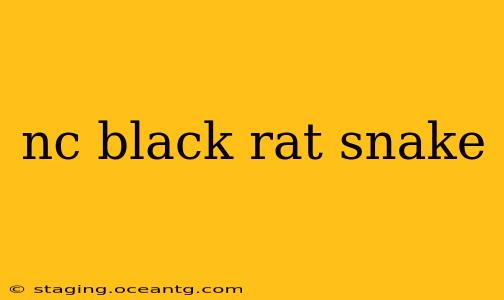North Carolina is home to a diverse range of snakes, but none are as impressive—or often misunderstood—as the black rat snake ( Pantherophis obsoletus). This large, non-venomous constrictor is frequently encountered throughout the state, leading to many questions and sometimes, fear. This guide will delve into the fascinating world of the NC black rat snake, addressing common concerns and providing valuable information for residents and nature enthusiasts alike.
What does a black rat snake look like in NC?
The NC black rat snake is easily recognizable by its size and, as its name suggests, often dark coloration. While they can range in color from a deep black to a dark gray or even brownish black, particularly when younger, mature black rat snakes are predominantly jet black. They lack the distinct patterns of some other rat snake subspecies. They are robust snakes, capable of reaching lengths of over six feet, and possess smooth scales. Identifying features to differentiate them from other similar species include their relatively large size, their smooth scales, and the lack of any significant markings. Juveniles may display subtle patterns which fade as they mature.
Are black rat snakes venomous?
No, black rat snakes are not venomous. They are constrictors, meaning they subdue their prey by wrapping their bodies around it and squeezing until it suffocates. This is a crucial point to remember, as many people mistakenly fear black rat snakes due to their size and appearance. Their non-venomous nature means they pose no danger of a venomous bite, and are far more beneficial than harmful to the ecosystem.
What do black rat snakes eat?
Black rat snakes are opportunistic feeders, preying primarily on rodents such as rats and mice. Their diet may also include other small mammals, birds, bird eggs, and occasionally lizards and frogs. Their appetite for rodents makes them valuable to farmers and homeowners, as they help control pest populations.
Where do black rat snakes live in NC?
Black rat snakes exhibit a wide distribution across North Carolina, inhabiting a variety of habitats. They prefer areas with abundant cover, such as forests, fields, and rocky outcrops. They are often found near water sources and may even venture into human-inhabited areas in search of food, which is often where many people encounter them.
How dangerous are black rat snakes to humans?
While black rat snakes are capable of inflicting a bite if they feel threatened, their bite is not medically significant. It is unlikely to cause serious harm and will not inject venom. Their primary defense mechanism is to flee, not attack. However, it is wise to admire these creatures from a safe distance, giving them space to escape. Never attempt to handle a wild black rat snake.
How can I tell the difference between a black rat snake and a black racer?
This is a common question, as both species can appear similar at first glance. However, there are some key differences: Black racers (Coluber constrictor ) are generally slimmer and more agile than black rat snakes. They also tend to have a slightly more pointed head and are usually faster-moving. While some black racers can be entirely black, many display some subtle markings, especially when younger. The most reliable way to differentiate is close examination of the scales and overall body proportions.
What should I do if I encounter a black rat snake in my home?
If you find a black rat snake in your home, the best course of action is to gently coax it outside using a broom or other long object. You can also contact a local wildlife rehabilitator or animal control service for assistance. Never attempt to handle the snake yourself. The presence of a black rat snake indicates a potential rodent problem, so addressing that issue will help prevent future encounters.
Are black rat snakes protected in North Carolina?
Black rat snakes are not currently listed as a protected species in North Carolina. However, it’s important to remember that they play a valuable role in the ecosystem and should be treated with respect and caution. Unnecessary harm or killing of these animals is discouraged.
By understanding the behavior and characteristics of the North Carolina black rat snake, we can better appreciate these fascinating creatures and coexist peacefully with them. Remember, these snakes are more beneficial than harmful, and a little knowledge can go a long way in dispelling myths and fostering responsible interactions with wildlife.
